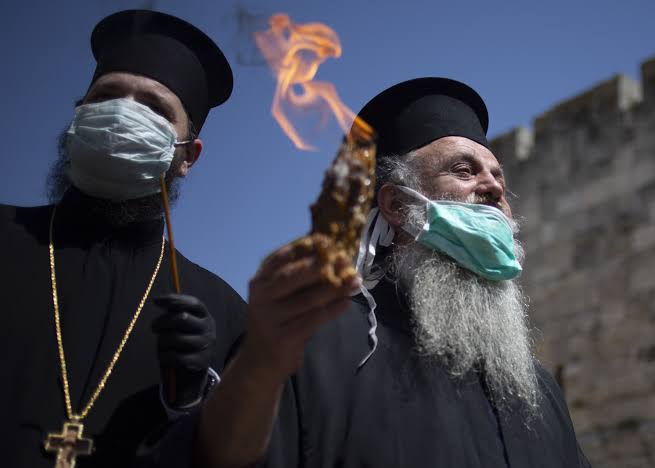Orthodox Christians celebrated the “Holy Fire” in the Church of the Holy Sepulchre in Jerusalem despite the coronavirus, with only a small number of people permitted to attend the ceremony by the Israeli authorities.
SEE ALSO: Sinach, Husband Blast Those Who Believe More In Science Than God
Israel has taken strict measures to contain the epidemic, closing all houses of worship and banning gatherings, measures which also apply in the West Bank.
According to Orthodox Christian belief, a fire descends miraculously to the Church of the Holy Sepulchre on Easter, the church built on the site where Jesus was buried and resurrected.
Greek Orthodox Patriarch Theophilos III lit candles at the “Holy Fire” in the Sepulchral Chapel, and passed the flame to waiting clergy.
Usually, the ceremony is attended by hundreds of believers who crowd into the church.
This year’s ceremony was broadcast on Palestinian television and other outlets.
The “Holy Fire” is then to be brought from the Church of the Holy Sepulchre in special containers to the airport near Tel Aviv, according to tradition, where planes from Russia, Greece, Bulgaria, Ukraine, and other mainly Orthodox countries will be waiting, according to a local representative.
In a break with tradition, the dignitaries will await the flame in their planes.
In Israel, 13,107 people have tested positive for the coronavirus and 158 have died, the Health Ministry said.
Some 300 people in the West Bank and 13 in the Gaza Strip are infected with the virus, according to the Health Ministry in Ramallah.
Two people have died in the West Bank.
Orthodox Christians celebrate Easter a week later than their mostly western counterparts as the Orthodox festival is determined according to the Julian calendar, which dates back to the Roman Empire and differs from the Gregorian calendar, adopted in the 16th century.

